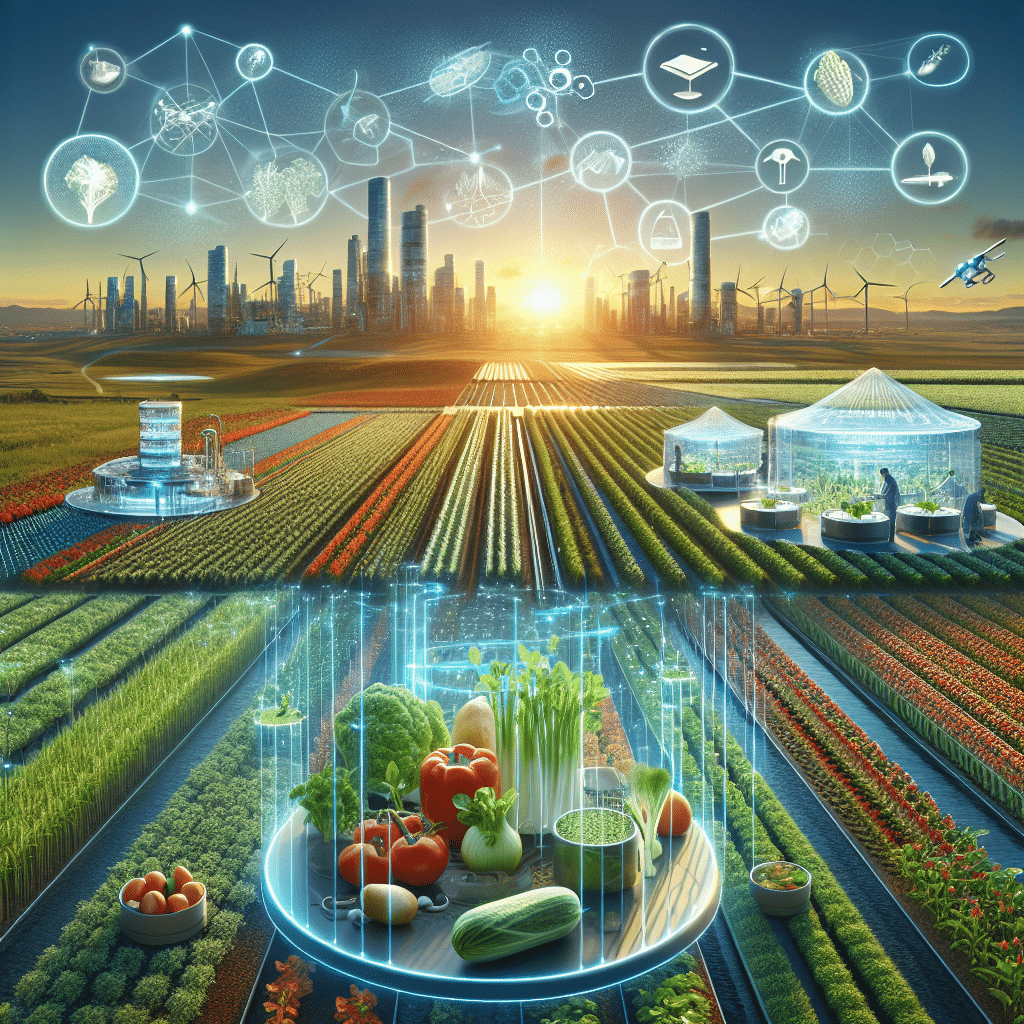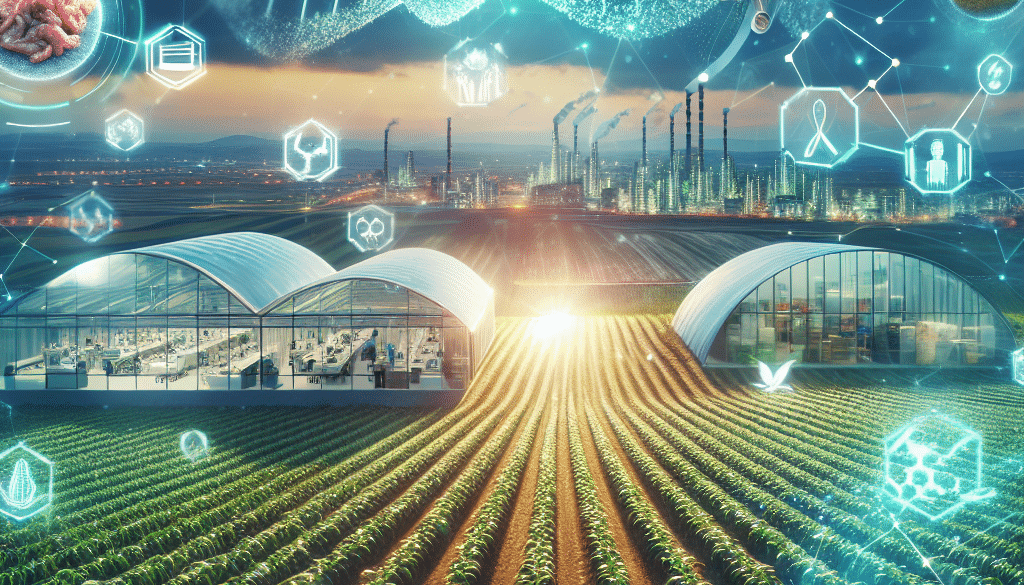On the Horizon: The Food Innovation Landscape
-
Table of Contents
Food Innovation Landscape: Emerging Trends and Technologies

The food industry is undergoing a transformation, driven by technological advancements and changing consumer preferences. As we look to the future, several key trends are shaping the food innovation landscape. This article explores these trends, providing insights into how they are revolutionizing the way we produce, consume, and think about food.
1. Sustainable Food Production
Sustainability has become a buzzword in the food industry, with consumers increasingly demanding products that are not only healthy but also environmentally friendly. Innovations in this area include:
- Vertical Farming: This method uses controlled environments to grow crops in vertically stacked layers, reducing land use and enabling local production in urban areas.
- Plant-based Proteins: Companies like Beyond Meat and Impossible Foods are leading the charge in creating meat alternatives that are more sustainable than traditional livestock farming.
- Regenerative Agriculture: This approach focuses on farming practices that restore soil health, improve water retention, and sequester carbon, thereby enhancing biodiversity.
2. Personalized Nutrition
With advances in science and technology, personalized nutrition is becoming more accessible. This trend is about tailoring diets to individual needs based on genetics, microbiome composition, and lifestyle:
- DNA-based Diets: Companies like Nutrigenomix offer genetic testing to provide personalized nutrition advice.
- Microbiome Testing: Startups like Viome analyze gut microbiota to recommend dietary changes for better health outcomes.
- Wearable Technology: Devices like fitness trackers help individuals monitor their dietary habits and adjust their food intake accordingly.
3. Food Safety and Traceability
Ensuring the safety and traceability of food products is paramount. Innovations in this area include:
- Blockchain Technology: Blockchain can provide a transparent and tamper-proof record of the food supply chain, as demonstrated by IBM’s Food Trust initiative.
- Smart Packaging: Packaging that changes color when a product is no longer safe to consume, or that includes QR codes for tracking the product journey, is becoming more common.
- AI in Food Inspection: Artificial intelligence is being used to detect contaminants and ensure quality control in food production facilities.
4. Alternative Food Sources
As the global population grows, finding alternative food sources is crucial. Innovations include:
- Insect Protein: Companies like Entomo Farms are turning to insects as a sustainable protein source.
- Lab-grown Meat: Cultured meat, produced in bioreactors without the need for animal slaughter, is being developed by companies like Memphis Meats.
- Algae and Seaweed: These aquatic plants are nutrient-rich and can be cultivated without freshwater or arable land.
5. The Rise of Functional Foods
Functional foods that provide health benefits beyond basic nutrition are gaining popularity. Examples include:
- Probiotics and Prebiotics: Foods enriched with beneficial bacteria or fibers that promote gut health.
- Superfoods: Ingredients like chia seeds, quinoa, and acai berries are touted for their high nutrient content.
- Fortified Foods: Products enhanced with vitamins, minerals, or other nutrients to address specific health concerns.
6. The Digitalization of Food
Technology is changing the way we order, deliver, and even cook food:
- Food Delivery Apps: Platforms like Uber Eats and DoorDash have revolutionized food delivery services.
- Smart Kitchen Appliances: Devices like the Instant Pot and smart ovens can be controlled remotely and assist with cooking.
- 3D Food Printing: This technology allows for the creation of customized food shapes and compositions, with applications in gastronomy and healthcare.
Conclusion
The food innovation landscape is rich with opportunities to create a more sustainable, healthy, and efficient food system. From vertical farming to lab-grown meat, personalized nutrition to smart packaging, the horizon is bright with possibilities. As consumers become more conscious of their dietary choices and the environmental impact of their food, the industry must continue to evolve and embrace these innovations.
For those interested in incorporating high-quality protein into their products, ETChem’s protein offerings are an excellent choice. Their range of collagens, including marine, fish, bovine, and chicken, are perfect for various applications in the nutraceutical, pharmaceutical, cosmeceutical, and food and beverage industries. With a commitment to quality and customer satisfaction, ETChem is poised to meet the growing demand for sustainable and health-focused food ingredients.
About ETChem
ETChem, a reputable Chinese Collagen factory manufacturer and supplier, is renowned for producing, stocking, exporting, and delivering the highest quality collagens. They include marine collagen, fish collagen, bovine collagen, chicken collagen, type I collagen, type II collagen and type III collagen etc. Their offerings, characterized by a neutral taste, instant solubility attributes, cater to a diverse range of industries. They serve nutraceutical, pharmaceutical, cosmeceutical, veterinary, as well as food and beverage finished product distributors, traders, and manufacturers across Europe, USA, Canada, Australia, Thailand, Japan, Korea, Brazil, and Chile, among others.
ETChem specialization includes exporting and delivering tailor-made collagen powder and finished collagen nutritional supplements. Their extensive product range covers sectors like Food and Beverage, Sports Nutrition, Weight Management, Dietary Supplements, Health and Wellness Products, ensuring comprehensive solutions to meet all your protein needs.
As a trusted company by leading global food and beverage brands and Fortune 500 companies, ETChem reinforces China’s reputation in the global arena. For more information or to sample their products, please contact them and email karen(at)et-chem.com today.




